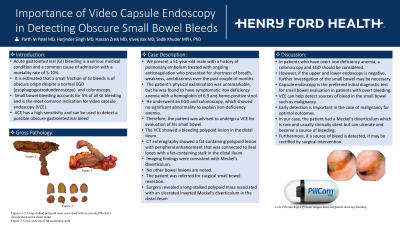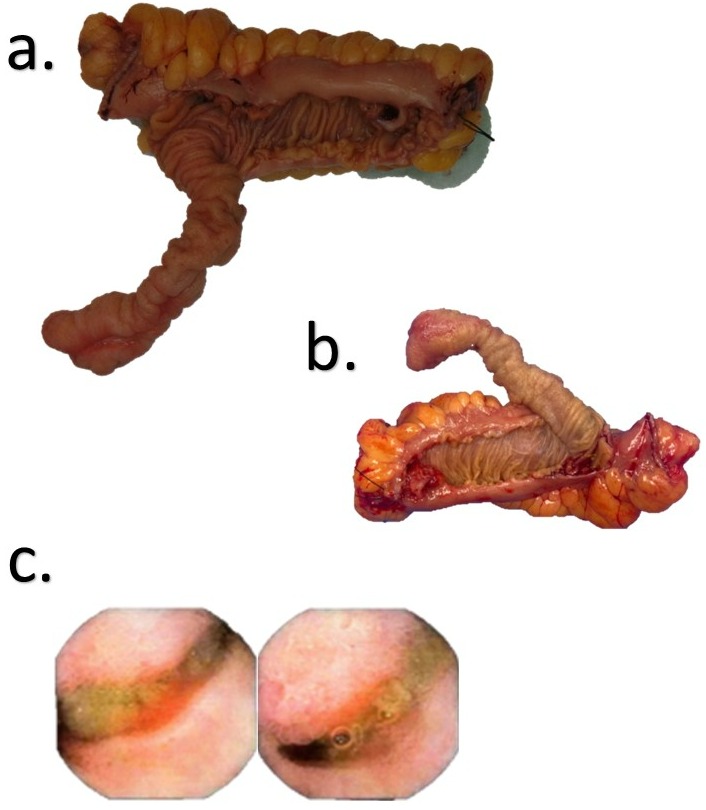Back


Poster Session B - Monday Morning
Category: GI Bleeding
B0343 - Rare Case of Inverted Meckle’s Diverticulum Leading to Blood Loss Anemia and Highlighting the Importance of Video Capsule Endoscopy in Detecting Obscure Small Bowel Bleeds
Monday, October 24, 2022
10:00 AM – 12:00 PM ET
Location: Crown Ballroom

Has Audio

Parth M. Patel, MD
Henry Ford Jackson
Jackson, MI
Presenting Author(s)
Parth M. Patel, MD, Hassan Zreik, MD, Harjinder Singh, MD, Vrajesh Parmar, MD, Sruthi Ramanan, MD, Merritt Bern, MD
Henry Ford Jackson, Jackson, MI
Introduction: Acute gastrointestinal (GI) bleeding is a serious medical condition and a common cause of admission with a mortality rate of 5-10%. It is estimated that a small fraction of GI bleeds is of obscure origin with a normal EGD (esophagogastroduodenoscopy) and colonoscopy. Small bowel bleeding accounts for 5% of all GI bleeding and is the most common indication for video capsule endoscopy (VCE). VCE is a novel procedure with high sensitivity to detect possible obscure gastrointestinal bleeding.
Case Description/Methods: The patient is a 51-year-old male with a history of pulmonary embolism treated with ongoing anticoagulation who presented for shortness of breath, weakness, and dizziness over the past couple of months. The patient's physical examination was unremarkable. The patient was found to have symptomatic iron deficiency anemia with a hemoglobin of 6.9 and heme-positive stool. He underwent an EGD and colonoscopy, which showed no significant abnormality to explain iron-deficiency anemia. Therefore, the patient was advised to undergo a VCE for his small bowel, which showed a bleeding polypoid lesion in the distal ileum. CT endoscopy showed a fat-containing polypoid lesion with peripheral enhancement connected to ileal loops with a fat-containing stalk in the distal ileum. Imaging findings were consistent with Meckel's diverticulum. No other bowel lesions are noted. The patient was referred for surgical small bowel resection. Surgery revealed a long-stalked polypoid mass associated with an ulcerated inverted Meckel's diverticulum in the distal ileum.
Discussion: A colonoscopy and EGD should be considered in patients with overt iron deficiency anemia. However, if the upper and lower endoscopy is negative, further investigation of the small bowel may be necessary. Capsule endoscopy is the preferred initial diagnostic test for small bowel evaluation in patients with overt bleeding. VCE can help detect sources of bleed in the small bowel, such as malignancy. Early detection is important in the case of malignancy for optimal outcomes. In our case, the patient had a Meckel's diverticulum, which is rare and usually clinically silent but can ulcerate and become a source of bleeding. Furthermore, if a source of bleed is detected, it may be rectified by surgical intervention.

Disclosures:
Parth M. Patel, MD, Hassan Zreik, MD, Harjinder Singh, MD, Vrajesh Parmar, MD, Sruthi Ramanan, MD, Merritt Bern, MD. B0343 - Rare Case of Inverted Meckle’s Diverticulum Leading to Blood Loss Anemia and Highlighting the Importance of Video Capsule Endoscopy in Detecting Obscure Small Bowel Bleeds, ACG 2022 Annual Scientific Meeting Abstracts. Charlotte, NC: American College of Gastroenterology.
Henry Ford Jackson, Jackson, MI
Introduction: Acute gastrointestinal (GI) bleeding is a serious medical condition and a common cause of admission with a mortality rate of 5-10%. It is estimated that a small fraction of GI bleeds is of obscure origin with a normal EGD (esophagogastroduodenoscopy) and colonoscopy. Small bowel bleeding accounts for 5% of all GI bleeding and is the most common indication for video capsule endoscopy (VCE). VCE is a novel procedure with high sensitivity to detect possible obscure gastrointestinal bleeding.
Case Description/Methods: The patient is a 51-year-old male with a history of pulmonary embolism treated with ongoing anticoagulation who presented for shortness of breath, weakness, and dizziness over the past couple of months. The patient's physical examination was unremarkable. The patient was found to have symptomatic iron deficiency anemia with a hemoglobin of 6.9 and heme-positive stool. He underwent an EGD and colonoscopy, which showed no significant abnormality to explain iron-deficiency anemia. Therefore, the patient was advised to undergo a VCE for his small bowel, which showed a bleeding polypoid lesion in the distal ileum. CT endoscopy showed a fat-containing polypoid lesion with peripheral enhancement connected to ileal loops with a fat-containing stalk in the distal ileum. Imaging findings were consistent with Meckel's diverticulum. No other bowel lesions are noted. The patient was referred for surgical small bowel resection. Surgery revealed a long-stalked polypoid mass associated with an ulcerated inverted Meckel's diverticulum in the distal ileum.
Discussion: A colonoscopy and EGD should be considered in patients with overt iron deficiency anemia. However, if the upper and lower endoscopy is negative, further investigation of the small bowel may be necessary. Capsule endoscopy is the preferred initial diagnostic test for small bowel evaluation in patients with overt bleeding. VCE can help detect sources of bleed in the small bowel, such as malignancy. Early detection is important in the case of malignancy for optimal outcomes. In our case, the patient had a Meckel's diverticulum, which is rare and usually clinically silent but can ulcerate and become a source of bleeding. Furthermore, if a source of bleed is detected, it may be rectified by surgical intervention.

Figure: Figures 1: a. & b. Pictures of the resected long-stalked polypoid mass associated with an inverted Meckel’s diverticulum in the distal ileum c. Images from Video Endoscopy showing GI bleed from the inverted Meckel's diverticulum
Disclosures:
Parth Patel indicated no relevant financial relationships.
Hassan Zreik indicated no relevant financial relationships.
Harjinder Singh indicated no relevant financial relationships.
Vrajesh Parmar indicated no relevant financial relationships.
Sruthi Ramanan indicated no relevant financial relationships.
Merritt Bern indicated no relevant financial relationships.
Parth M. Patel, MD, Hassan Zreik, MD, Harjinder Singh, MD, Vrajesh Parmar, MD, Sruthi Ramanan, MD, Merritt Bern, MD. B0343 - Rare Case of Inverted Meckle’s Diverticulum Leading to Blood Loss Anemia and Highlighting the Importance of Video Capsule Endoscopy in Detecting Obscure Small Bowel Bleeds, ACG 2022 Annual Scientific Meeting Abstracts. Charlotte, NC: American College of Gastroenterology.
